Theorising Goverance Change for a Sustainable Economy – This workshop was held on 30th April 2013 and sought to explore and better understand theoretical approaches to understanding change in governance systems, with a particular focus on managing transformation to a more sustainable energy system and economy.
Workshop 1
-
Presentation: Introduction to Day
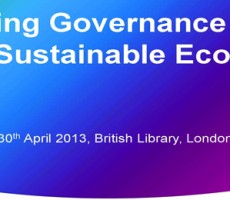
Final Agenda 9.40 Introduction to day • Richard Hoggett – DOWNLOAD presentation: Hoggett_R – welcome 9.45 – 11.00 Panel 1: Chair Richard Hoggett • Caroline Kuzemko and Matthew Lockwood – The Importance of Governance for Innovation: a Theory of Managed Energy Transition • Ronan Bolton and Tim Foxon – Negotiating the energy policy ‘trilemma’ – an analysis of UK energy governance from a socio-technical systems perspective • Audley Genus – The Governance of Sustainability Transitions: a discourse-institutional approach 11.15 – 12.30 Panel 2: Chair Caroline Kuzemko • Frank Geels – Politics and power
Read More » -
Panel 1: The importance of governance for innovation: a theory of practice transition
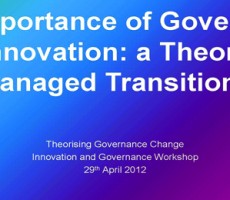
The importance of governance for innovation: a theory of practice transition Matthew Lockwood, Caroline Kuzemko, Catherine Mitchell, Richard Hoggett – University of Exeter Abstract Understanding why and how it is that some countries are able to implement policies which lead to deeper and faster change in sustainable practices and outcomes is an important step in enabling an acceleration in the transition to a sustainable energy future. This paper presents a tentative, provisional framework for analysing energy system transition, differential outcomes and the reasons for them. It suggests that energy system rules (in enabling or blocking
Read More » -
Panel 1: Negotiating the energy policy ‘trilemma’ – an analysis of UK energy governance from a socio-technical systems perspective
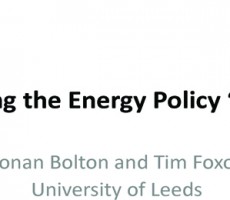
Negotiating the energy policy ‘trilemma’ – an analysis of UK energy governance from a socio-technical systems perspective Ronan Bolton and Tim Foxon – University of Leeds Abstract: This paper analyses contemporary energy governance dynamics in the UK, focusing on recent policy changes designed to promote electricity sector investment and enable the transition towards a low carbon energy system. The purpose of the paper is to analyse how UK energy governance is evolving to address the energy policy ‘trilemma’ of affordability, decarbonisation and energy security, and to explore potential implications for long term transition pathways to
Read More » -
Panel 1: Sustainability transitions: a discourse-institutional approach
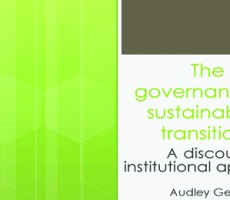
Sustainability transitions: a discourse-institutional approach Audley Genus – Kingston University Abstract: The paper considers problems and possibilities connected with governing and realising the ‘transition to sustainability’ – or at least a more deeply resilient energy system. Conceptually its focus is on institutional and discourse analysis and the development of a discourse-institutional perspective of the transition to sustainability. The first strand of the paper outlines the potential insights that may be derived from adopting an approach based on a more thoroughgoing appreciation and application of Scott’s (2008) work on neo-institutional theory and its relevance to the
Read More » -
Panel 2: Politics and power in low-carbon electricity transitions: A multi-level analysis of green niche-innovations and resilient regimes
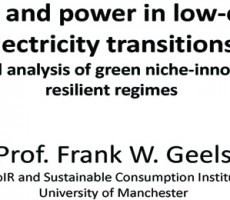
Politics and power in low-carbon electricity transitions: A multi-level analysis of green niche-innovations and resilient regimes Frank Geels – University of Manchester Abstract: This paper aims to draw the attention of social theorists to the topic of transitions in socio-technical systems. This topic has great promise for debates on climate change, peak oil and wider sustainability challenges, which require shifts to new energy systems, food systems and mobility systems. Socio-technical transitions are not just technological and economic processes, but also entail political power struggles and cultural discourses. The paper introduces the multi-level perspective on transitions
Read More » -
Panel 2: The rise of accelerated energy innovation and its implications for innovation theory
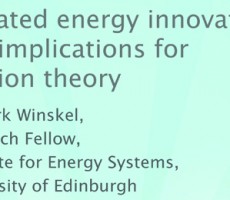
The rise of accelerated energy innovation and its implications for innovation theory Mark Winskel – University of Edinburgh Abstract: This paper considers the changing dynamics of energy innovation under accelerated change imperatives. It also reflects on the role of innovation theory in sociotechnical system change, in the context accelerated change imperatives. It will consider the possibility that prominent sustainable innovation theories, because they articulate an essentially niche-led account of sociotechnical system change, offer a partial view of innovation dynamics for highly coupled sociotechnical systems under accelerated innovation imperatives. This will be considered by reference to
Read More » -
Panel 2: The Politics of low carbon transitions – protected niches, actors networks, narratives and changing contexts
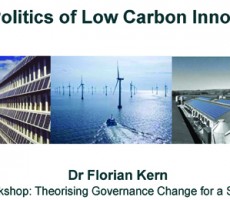
The Politics of low carbon transitions – protected niches, actors networks, narratives and changing contexts Florian Kern, Adrian Smith, Rob Raven and Bram Verhees Abstract: Understanding how to move towards more sustainable societies is a key challenge for analysts, civil society organisations and policy makers alike. The literature on sustainability transitions indicates an important role for niche activities which have the potential to overturn or green incumbent socio-technical regimes. In the context of climate change, many advocates and policy makers put a lot of hope in renewable energy technologies like solar photovoltaics and offshore wind
Read More » -
Panel 3: From transitions to transformation: The Political Economy of Governing Energy in a Carbon Constrained World

From transitions to transformation: The Political Economy of Governing Energy in a Carbon Constrained World Peter Newell – University of Sussex Abstract: This presentation focuses on the potential contributions from literatures on (i) political economy in general (ii) the political economy of development in particular and (iii) global governance, with regard to debates on transitions and governance change for a sustainable economy. I try to show how these are useful for getting a handle on questions which I take to be central to any enquiry into governance, namely: 1. Who governs (and who does not)
Read More » -
Panel 3: Why Waste a Good Crisis? Making an Economic Policy Revolution
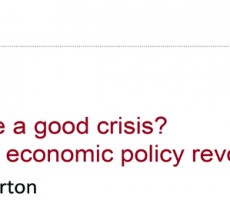
Why Waste a Good Crisis? Making an Economic Policy Revolution Hugh Pemberton Abstract: Five years on from the onset of the present economic crisis one might expect a policy revolution to be underway. Certainly, that was the result of the crisis set off by the financial crash of 1929, and of the difficult years of the 1970s. Yet so far those hoping for such a revolution continue to wait in vain. In this paper I consider why no paradigm shift has occurred this time around. I begin by discussing Peter A. Hall’s influential 1993 article
Read More » -
Panel 3: Regulatory change in UK renewable energy support policies: the role of discourse and ideology
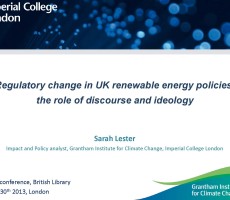
Regulatory change in UK renewable energy support policies: the role of discourse and ideology Sarah Lester Abstract: This paper examines policy change within UK electricity regulation and market reform for climate change policies, focusing on renewable energy regulation in the UK for low-carbon electricity generation technologies: questioning what drives the choice in frameworks, regulatory tools and mechanisms to support renewable energy deployment in the UK policy process? The paper also examines the motivations for reform, government rhetorics, and how actors (from government, business, public, stakeholders) inform the policy process and choice of mechanisms. The central
Read More »






